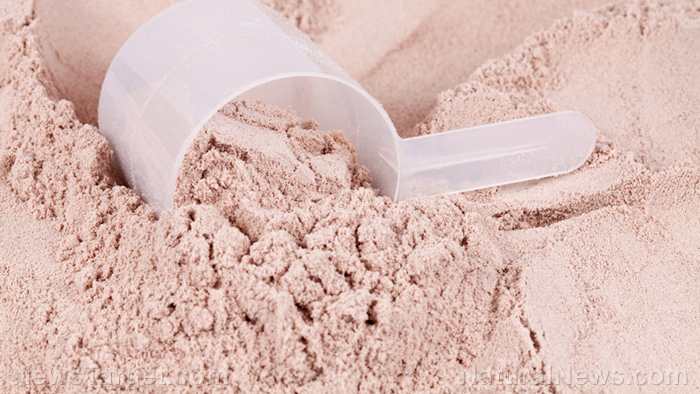Shredded: Whey protein and resistance exercise are the perfect combo for muscle mass gain
06/05/2019 / By Michelle Simmons

Whey protein is a popular supplement taken by athletes and bodybuilders alike, and for good reason: It’s useful in helping build muscles, especially when combined with strength training or resistance exercise. A study published in the journal Nutrition Research suggests that whey protein can be used as a nutritional supplement to support muscle growth because of its ability to counter the oxidative stress induced by a high-intensity exercise.
Researchers at the Federal University of Ouro Preto in Brazil assessed whether whey protein could contribute to muscle weight gain in response to resistance exercise. Whey protein is known for its nutritional value and antioxidant properties.
For the study, they hypothesized that consuming whey protein could increase muscle weight gain. To test this, the researchers subjected rats to a resistance exercise program, which lasted for eight weeks. During this period, some of the rats in the experimental group were given whey protein. The researchers also measured body and muscle weight gains, muscle glutathione content, histopathology, muscle antioxidant enzyme activities, and gene expression.
The results revealed that rats fed with whey protein had higher body and muscle weight gains than those that were not fed with whey protein supplements. In addition, consumption of whey protein also inhibited the oxidative effects induced by resistance exercise. The researchers noted that these beneficial effects of whey protein may be attributed to its antioxidant properties. From these findings, they concluded that whey protein intake could increase muscle growth.
Whey protein both beneficial for muscle building and weight loss
Whey protein supplementation, together with resistance exercise, can help enhance muscle protein synthesis and promote the growth of lean tissue mass. A study published in the International Journal of Sport Nutrition and Exercise Metabolism found that men who supplemented with whey protein during resistance training had a greater relative gain in lean tissue mass.
Supplementing with whey isolate is also better than supplementing with casein for building muscle, according to another study published in the same journal. Researchers reported that whey isolate supplementation significantly resulted in greater gains in strength, lean body mass, and a decrease in fat mass compared with supplementation with casein during an intense 10-week resistance-training program.
Other benefits of consuming whey protein
Beyond muscle building and weight loss, whey protein also offers many other health benefits. This high-quality protein source helps lower blood pressure and blood sugar levels and reduce symptoms of stress and depression. Various studies have also shown that it may protect against cancer, improve the symptoms of hepatitis, increase bone mineral density, boost immune function in HIV patients, and prolong the life of mice.
Whey is rich in essential amino acids like cysteine, which increases the levels of the antioxidant glutathione and leads to many health benefits. It also contains other nutrients, such as lactoferrin, beta-lactoglobulin, alpha-lactalbumin, and immunoglobulins. (Related: Nutrients in whey protein may offer solutions to diseases such as diabetes, cardiovascular disorders, and poor bone formation.)
Taking whey protein is generally safe. A commonly recommended dose is 25 to 50 grams (g) — equivalent to one to two scoops — per day. Avoid consuming too much of it because it can cause digestive issues such as nausea, flatulence, diarrhea, pain, and cramping. Some people may also be allergic to whey protein because it is a mixture of proteins isolated from whey — the liquid part of milk that separates during cheese production.
Learn more about supplements for building muscles like whey protein at SupplementsReport.com.
Sources include:
Tagged Under: antioxidants, fightobesity, fitness, food science, Glutathione, muscle, muscle growth, nutrition, protein, research, resistance exercise, slender, supplements, whey, whey protein
RECENT NEWS & ARTICLES
COPYRIGHT © 2017 FIGHTOBESITY.NEWS
All content posted on this site is protected under Free Speech. FightObesity.news is not responsible for content written by contributing authors. The information on this site is provided for educational and entertainment purposes only. It is not intended as a substitute for professional advice of any kind. FightObesity.news assumes no responsibility for the use or misuse of this material. All trademarks, registered trademarks and service marks mentioned on this site are the property of their respective owners.


















